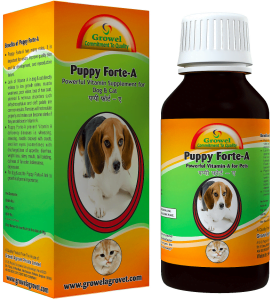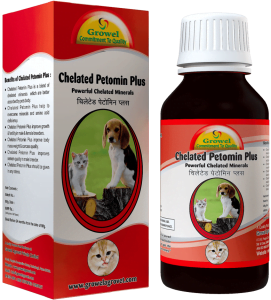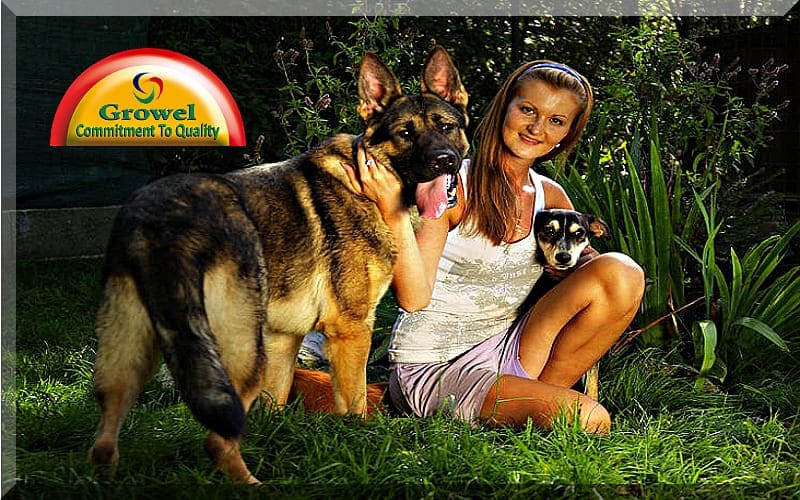 Mental Wellness of Dogs can be defined as emotional contentment and satisfaction, in other words, a state of persistent happiness of dogs. Unfortunately, we humans have enough trouble agreeing on what constitutes a state of happiness. So, how are we to know what it means to our four-legged friends? To help us figure this out, let’s take a look at what causes them to be unhappy and what we need to do for mental wellness of dogs. Animal experts agree that most unhappiness and mental distress in dogs is caused by fear, anxiety, and/or frustration, emotions that invariably lead to behavioural challenges. Grief and despondence at the loss of a companion or separation from pack members can also lead to stress and mental illness, as can anger and aggression, especially if the source inciting the belligerent behavior is not removed.
Mental Wellness of Dogs can be defined as emotional contentment and satisfaction, in other words, a state of persistent happiness of dogs. Unfortunately, we humans have enough trouble agreeing on what constitutes a state of happiness. So, how are we to know what it means to our four-legged friends? To help us figure this out, let’s take a look at what causes them to be unhappy and what we need to do for mental wellness of dogs. Animal experts agree that most unhappiness and mental distress in dogs is caused by fear, anxiety, and/or frustration, emotions that invariably lead to behavioural challenges. Grief and despondence at the loss of a companion or separation from pack members can also lead to stress and mental illness, as can anger and aggression, especially if the source inciting the belligerent behavior is not removed.
Physically, stress affects dogs just as it does us, causing a marked increase in heart rate, blood pressure, and nervous output. If the stress is chronic, the immune system can become depressed, leaving the body susceptible to a wide variety of diseases, including cancer.
Promoting mental wellness of dogs means reducing stress in their lives as much as possible. Doing so has key implications for our own health as well. The importance of the human–companion animal bond and its positive effect on human health has been studied extensively in recent years. No one will argue that we form deep emotional attachments to our pets. It stands to reason that if our pets become stressed, we will experience stress as well. As a result, by promoting mental wellness of dogs, we enhance not only their quality of life, but ours as well.
So how do we do it? We do it by ensuring that the emotional and physical needs of our pets are being met. To encourage positive emotions, our pets need positive mental stimulation on a daily basis, predictability and control in their lives, and dependable social companionship. Physical needs include ready access to food, water, and shelter, and the ability to eliminate when the need arises. These needs also include freedom from illness and/or pain. That said, here are some positive steps we can take to promote mental wellness of dogs :
1. Go to extra lengths to make sure your dog or cat is properly desensitized and socialized in its first few months of life. Doing so will dramatically decrease fear, anxiety, and stress as your pet matures.
2. Daily walks, exercise sessions, play periods, and/or grooming sessions will all contribute to overall mental wellness and contentment of your pet while promoting physical vibrancy at the same time. This is especially true for older pets, whose diminished sensory awareness and physical deterioration may burden them with feelings of detachment and isolation. Without a doubt, the comfort of continued interaction with the ones they love will help ease the stress and burden associated with the aging process.
3. Dogs kept fenced up outdoors with limited social companionship, cats confined to limited space for long periods of time, or any pet that perceives its environment as monotonous and unstimulating, may turn to nuisance vocalizations, inappropriate eliminations, destructive activities, and even self-mutilation as a way to spice up their lives and cope with their boredom and stress. As a result, make your dog an indoor (or at the very least, an indoor-outdoor) pet, and provide your cat with plenty of space to roam and explore.
4. Allowing dogs and cats to engage in problem solving and decision making will invariably provide high levels of mental satisfaction. When designing games and activities for your pet, get creative and think of ways you can stimulate its thinking process. For instance, when playing fetch with your dog, try throwing two sticks at once instead of just one. Forcing your dog to make a decision on which stick to go for first provides healthy positive mental stimulation.
5. Dogs and cats are creatures of habit. Although they need positive mental stimulation in the form of variety, they also need predictability in their lives in order to keep stress levels to a minimum. For example, a dog or cat will come to expect that evening meal (regardless of the type of bowl you use), or that daily hour of play (regardless of the activity), and if missed, will stress over it. Pencil your pet into your busy schedule and stick to a daily routine.
6. Catering to your pet’s instinctive cravings will help prevent boredom and the stress that it causes. For example, if you own a terrier, provide it with its own place to dig, whether this is a sandbox or designated area of the yard. If you own a hunting dog, yet you don’t hunt, design games and “hide and seek” activities that will stimulate your dog’s instinctive juices to flush out or give chase to game. If you own a cat, use interactive toys to play “cat and mouse,” thereby satisfying its urge to stalk and hunt. Provide enough variety, novelty, and interaction to allow your dog to be a dog and your cat to be a cat !
7. Be sure to properly establish a dominance hierarchy between you and your pet through proper training. Failure to do so will lead to a continual power struggle that will increase stress levels for both of you.
8. A houseful of visitors can be stressful to both dogs and cats, who often view the human visitors as territorial intruders. It may be less stressful to temporarily isolate your pet from the crowd rather than force them to hide from or unwillingly interact with strange people.
9. Introducing a new puppy or adult dog into a household already containing an adult cat can be highly stressful for the latter, who may never fully warm up to the new addition. On the contrary, introducing a new kitten into a home containing an adult dog is usually less traumatic; in fact, most kittens will be “adopted” by their canine housemates over time. Although this is not a hard-and-fast rule, it should be kept in mind whenever planning new pet additions to your home.
10. Have your pets neutered. This is especially true for male dogs and cats, who can become quite stressed and frustrated if not allowed to roam, fight, and satisfy their territorial and sexual urges.
11. If your pet becomes highly stressed when traveling or boarding, consider hiring a pet sitter to take care of your pet at your home while you are away. Not only will your pet feel more comfortable in its own environment, but you’ll also reap the peace of mind knowing that someone is watching over your house in your absence.
12. Provide fresh food and water to your pet on a daily basis.
13. Obviously, pain, injury, and illness can all wreak havoc on a pet’s mental health. As a result, prioritize your pet’s preventive health care program and observe the rules of longevity. Preventing injuries or catching illnesses early in their development will keep your pet happy, both mentally and physically.
Major Nutrients for Promoting Mental Wellness of Dogs:
Did you know your dog’s diet and nutrition may play a critical role in brain function and behavior?
If you’ve ever felt lazy after eating a big meal, or hyperactive following a sugary treat, then you have an idea of how what we eat can affect our behavior. The same applies to dogs. In fact, scientists now believe it’s possible to change the neurological and physical aspects of a dog’s brain, thus directly affecting his behavior and intelligence, through nutrition.
Following are the major nutrients which are playing a critical role in mental wellness of dogs :
Magnesium: Magnesium is one of the more central minerals for use in your dog’s body. It famously contributes to the normal function of the nervous system, a bodily function that is essential for the maintenance of the brain.
Zinc: Zinc is arguably one of the most versatile minerals around due to its multitude of uses in the body. However, in this case, it is important for pet brain health because it is known to contribute to normal psychological function.
Vitamin E: Vitamin E is a great micronutrient to have in this supplement as it is known to contribute to the protection of cells from oxidative stress. Such a problem, if left unchecked, can cause varying damage to a dog’s brain.
Vitamin-B: Vitamin:B including B-6 and B-12. Vitamin B-6 helps form neurotransmitters and is involved with brain development. Vitamin B-12 essential for brain and nerve function and for forming red blood cells and DNA. Studies have reported that supplementation with vitamin B6, vitamin B12 has positive effects on memory performance in women. Foods that are commonly found in dog food that are high in the B vitamins include most meats, and sea foods for B-6 and B-12 and chickpeas and spinach for B-6.
Omega 3 Fatty Acids: As if we need another reason to include foods high in Omega 3 fatty acids, there is a linkage between diets high in Omega 3’s and a reduced risk of Alzheimer’s disease. Omega 3’s have also been used as treatment for mood disorders. Foods commonly found in dog food that are high in Omega 3’s include salmon and other fatty fish, as well as flax and krill.
As mentioned earlier, stress in a pet will manifest itself most often as a behavioral challenge. As a result, if your pet is exhibiting such behavior, attempt to uncover the underlying source of stress and eliminate (or minimize) it. This is where the veterinarian can help, by assisting in rooting out the source and recommending an appropriate solution. Occasionally, antianxiety medications and behavioral modification agents may be prescribed for controlling stress in select patients. However, most veterinarians will use these only as a last resort,when all other modes of behavior modification have been exhausted.
Promoting mental wellness of dog is the job of everyone who chooses totake on the responsibility of pet ownership. Our pets rely on us to help satisfy both their emotional and physical needs, and by so doing, we automatically improve their quality of life. After all, the old saying “To live without stress is to live” is as true for our pets as it is true for us! You should also read this article Parasites in Dogs- Cause & Treatment
You can join Dog & Pet Healthcare Facebook group for a getting regular guidance of yours dogs & pet’s health.
 |  |















